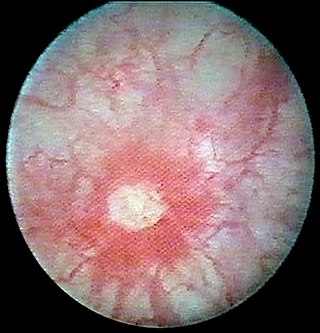
Interstitial cystitis (IC), a type of bladder pain syndrome (BPS), is chronic pain in the bladder and pelvic floor of unknown cause. Symptoms include feeling the need to urinate right away, needing to urinate often, and pain with sex. IC/BPS is associated with depression and lower quality of life. Many of those affected also have irritable bowel syndrome and fibromyalgia.
Vulvodynia is a chronic pain condition that affects the vulvar area and occurs without an identifiable cause. Symptoms typically include a feeling of burning or irritation. It has been established by the ISSVD that for the diagnosis to be made symptoms must last at least three months.
Bioethics is both a field of study and professional practice, interested in ethical issues related to health, including those emerging from advances in biology, medicine, and technologies. It proposes the discussion about moral discernment in society and it is often related to medical policy and practice, but also to broader questions as environment, well-being and public health. Bioethics is concerned with the ethical questions that arise in the relationships among life sciences, biotechnology, medicine, politics, law, theology and philosophy. It includes the study of values relating to primary care, other branches of medicine, ethical education in science, animal, and environmental ethics, and public health.

Pelvic pain is pain in the area of the pelvis. Acute pain is more common than chronic pain. If the pain lasts for more than six months, it is deemed to be chronic pelvic pain. It can affect both the male and female pelvis.

Chronic prostatitis/chronic pelvic pain syndrome (CP/CPPS), previously known as chronic nonbacterial prostatitis, is long-term pelvic pain and lower urinary tract symptoms (LUTS) without evidence of a bacterial infection. It affects about 2–6% of men. Together with IC/BPS, it makes up urologic chronic pelvic pain syndrome (UCPPS).

Pelvic congestion syndrome, also known as pelvic vein incompetence, is a long-term condition believed to be due to enlarged veins in the lower abdomen. The condition may cause chronic pain, such as a constant dull ache, which can be worsened by standing or sex. Pain in the legs or lower back may also occur.
Virginia Braun is a New Zealand psychology academic specialising in thematic analysis and gender studies. She is particularly known for her scholarship on the social construction of the vagina and designer vagina cosmetic surgery, body hair and heterosexuality. She is perhaps best known for her collaboration with British psychologist Victoria Clarke around thematic analysis and qualitative research methods. Together they have published numerous papers, chapters, commentaries and editorials on thematic analysis and qualitative research, and an award-winning and best selling qualitative textbook entitled Successful qualitative research. They have a thematic analysis website at The University of Auckland. More recently - with the Story Completion Research Group - they have published around the story completion method.
Hanne Albert is a Danish physiotherapist with a Ph.D. in medical science. Her main research interest is in lower back pain and pelvic girdle pain. Albert's studies have revealed that bone œdema could be caused by a bacterial infection and treated with antibiotics.

Wendy Larner is a New Zealand social scientist who has focussed on the interdisciplinary areas of globalisation, governance and gender. She has been Vice-Chancellor and President of Cardiff University since September 2023, having previously been provost at Victoria University, Wellington, New Zealand.

Irene Mary Carmel Tracey is Vice-Chancellor of the University of Oxford and former Warden of Merton College, Oxford. She is also Professor of Anaesthetic Neuroscience in the Nuffield Department of Clinical Neurosciences and formerly Pro-Vice-Chancellor at the University of Oxford. She is a co-founder of the Oxford Centre for Functional Magnetic Resonance Imaging of the Brain (FMRIB), now the Wellcome Centre for Integrative Neuroimaging. Her team’s research concerns the neuroscience of pain, specifically pain perception and analgesia as well as how anaesthetics produce altered states of consciousness. Her team uses multidisciplinary approaches including neuroimaging.
Doreen Anne Rosenthal is an Australian academic and adolescent sexual health and women's health researcher. As of 2020, she is a Professor Emerita in the School of Population Health at La Trobe University and Honorary Professor in the Melbourne School of Population and Global Health at the University of Melbourne.
Urologic chronic pelvic pain syndrome (UCPPS) is ongoing bladder pain in either sex, chronic prostatitis/chronic pelvic pain syndrome (CP/CPPS) in men and interstitial cystitis or painful bladder syndrome (IC/PBS) in women.
Pelvic floor physical therapy (PFPT) is a specialty area within physical therapy focusing on the rehabilitation of muscles in the pelvic floor after injury or dysfunction. It can be used to address issues such as muscle weakness or tightness post childbirth, dyspareunia, vaginismus, vulvodynia, constipation, fecal or urinary incontinence, pelvic organ prolapse, and sexual dysfunction. Licensed physical therapists with specialized pelvic floor physical therapy training address dysfunction in individuals across the gender and sex spectra, though PFPT is often associated with women's health for its heavy focus on addressing issues of pelvic trauma after childbirth.
Krina Tynke Zondervan is a Dutch biomedical scientist who is a Professor of Genomic Epidemiology at the University of Oxford. She serves on the board of the World Endometriosis Society.

Menstrual stigma refers to the negative social and cultural perceptions, beliefs, taboos, and practices surrounding menstruation. It encompasses the perception of menstruation as impure or shameful and often leads to secrecy and emotional distress. The manifestation of menstrual stigma varies across cultures and may have profound effects on mental health, social participation, and opportunities. Strategies aimed at addressing menstrual stigma typically involve educational and awareness initiatives.
Annemarie Goldstein Jutel is a New Zealand academic, and is a full professor at Victoria University of Wellington, specialising in the sociology of medical diagnosis.
Gisela Sole is a South African–New Zealand academic physiotherapist, and is a full professor at the University of Otago, specialising in sports injuries and management of musculoskeletal conditions.
Elizabeth Jean Carleton Hay-Smith is a New Zealand academic, and is a full professor at the University of Otago in Wellington, specialising in research on non-surgical treatments for pelvic organ prolapse and bladder problems.

Rosemary Ann Du Plessis is a New Zealand academic sociologist, and is an adjunct associate professor at the University of Canterbury. In 2020 she was appointed an Officer of the New Zealand Order of Merit for services to women and education.

Ruth Lilian Spearing is a New Zealand haematologist, and researches blood cancer. In 2023 Spearing was appointed a Companion of the New Zealand Order of Merit for services to haematology.








